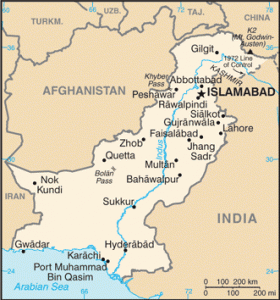As you’ve probably heard, the 4th Circuit rejected Jose Padilla’s suit against Donald Rumsfeld on Tuesday. Both Lyle Denniston and Steve Vladeck have good summaries of the decision, which basically says the courts can’t grant damages for constitutional abuses not otherwise covered by law until such time as Congress sees fit to cover them in law:
The factors counseling hesitation are many. We have canvassed them in some detail, but only to make a limited point: not that such litigation is categorically forbidden by the Constitution, but that courts should not proceed down this highly problematic road in the absence of affirmative action by Congress. If Congress were to create a damages remedy here, we would trust that the legislative process gave due consideration to the broader policy implications that we as judges are neither authorized nor well-positioned to balance on our own.
But if that’s not circular enough reasoning for you, here’s a more disturbing one–one which may have troubling implications given the recent codification of indefinite detention.
The 4th Circuit Opinion hews closely to the argument the government made in its amicus brief which, as I described last year, itself engaged in circular logic. It effectively invoked national security to say that the court couldn’t consider Padilla’s deprivation of due process. And then having bracketed off the lack of due process that got him put in the brig with no access to lawyers, they effectively punted on the torture complaint.
To explain their failure to treat torture in their filing, they say 1) that the other defendants are addressing it and 2) they don’t have to deal with it anyway because the President has said the US does not engage in torture (which is precisely what Bush said when torture was official policy):
In this brief, we do not address the details of Padilla’s specific treatment allegations, which have already been thoroughly briefed by the individual defendants.1
1 Notwithstanding the nature of Padilla’s allegations, this case does not require the court to consider the definition of torture. Torture is flatly illegal and the government has repudiated it in the strongest terms. Federal law makes it a criminal offense to engage in torture, to attempt to commit torture, or to conspire to commit torture outside the United States. See 18 U.S.C. § 2340A. Moreover, consistent with treaty obligations, the President has stated unequivocally that the United States does not engage in torture, see May 21, 2009 Remarks by the President on National Security.
Note that bit, though, where the government acknowledges that torture is illegal?
That’s important, because they base their objections to the Bivens complaint in part on the possibility that a court could review Padilla’s treatment–treatment he alleges amounts to torture, which the government accepts is illegal–and determine whether it was in fact torture and therefore illegal.
Padilla also seeks damages in regard to the lawfulness of his treatment while in military detention. Thus, a court would have to inquire into, and rule on the lawfulness of, the conditions of Padilla’s military confinement and the interrogation techniques employed against him. Congress has not provided any such cause of action, and, as the district court concluded (JA 1522), a court should not create a remedy in these circumstances given the national security and war powers implications.
And they’re arguing Congress–which passed laws making torture illegal (to say nothing of the Constitution prohibiting cruel and unusual punishment)–didn’t provide for a cause of action.
That is, Padilla can’t sue both because Congress has made it illegal but not provided a cause of action here and … national security!
Effectively, then, the government shielded torture by shielding the initial lack of due process from all oversight under national security and therefore depriving Padilla of recourse once he lost his access to due process.
In my opinion, the 4th Circuit brief actually magnifies this problem. Check out the language in these two passages:
Special factors do counsel judicial hesitation in implying
causes of action for enemy combatants held in military detention.
[snip]
With respect to detainees like Padilla, Congress has provided for limited judicial review of military commission decisions, but only by the District of Columbia Circuit Court of Appeals, and only after the full process in military courts has run its course. 10 U.S.C. § 950g. And to the extent that the Supreme Court in Boumediene v. Bush, 553 U.S. 723 (2008), permitted further judicial examination of the detention of enemy combatants, it did so using the limited tool of the constitutionally guaranteed writ of habeas corpus—not an implied and open-ended civil damages
action. See id. at 797. [my emphasis]
That is, the 4th Circuit did not consider whether American citizens with no other recourse could sue under Bivens for having been turned into enemy combatants precisely to deprive them of their rights. Rather, it considered whether “enemy combatants held in military detention” and “detainees like Padilla” had access to Bivens. It thereby ignored the most fundamental part of the process, where the Bush Administration removed Padilla, a citizen, from civilian detention with access to due process, and made him an enemy combatant.
The 4th Circuit denies Padilla the ability to sue for being deprived of his constitutional right to due process by considering him not as a citizen deprived of his constitutional rights, but as a detainee whose constitutional rights had already been suspended.
Which makes the final passages of this opinion all the more nauseating. Having premised their entire decision not on Padilla’s rights as a citizen, but on his rights as an enemy combatant (even seemingly referring to him as a detainee, in the present tense), they then argue that there would be no incremental harm for Padilla between being a citizen convicted of a felony through due process and being an enemy combatant.
It is hard to imagine what “incremental” harm it does to Padilla’s reputation to add the label of “enemy combatant” to the fact of his convictions and the conduct that led to them.
This entire suit is about the magical power that term “enemy combatant” has to put an American citizen beyond the realm of due process (and, in Padilla’s case, to be tortured precisely because he has lost due process). That is precisely the logic the judges use throughout this opinion. And yet they simply can’t imagine what the difference between being a citizen–even one convicted of multiple felonies–and being an enemy combatant is?
And then there are the larger implications of this. In a world where indefinite detention is now codified into law, in a world where Padilla has always delimited the possible applications of claimed authority to hold American citizens captured in this country as enemy combatants, the circuit that covers CIA’s and JSOC’s actions–not to mention the two military brigs, Charleston and Quantico, that would be the most likely places to detain American citizens–just accorded that term, “enemy combatant,” magical status. Once applied to an American citizen, the 4th Circuit says, the Executive Branch is absolved of any infringements of a citizen’s constitutional rights, even the infringements of constitutional rights used to get him into that magic status in the first place.



